Will Apple's rumored tablet be an 'iPod touch DX'? It's all about perception

In the race to bigger, more powerful mobile devices, Apple ought to take a lesson from Amazon.
First, the rumor: Apple's rumored touchscreen tablet device got more traction today in a Financial Times article stating that the device will take its first bow in time for the holiday buying season.
The device, which is rumored to resemble an enlarged iPod touch, is expected to be roughly 10-inches in size and run on the iPhone operating system. Naturally, the driver for such a device is the App Store, the established, easy-to-use content pipeline that makes spending money easier than taking a $10 bill out of your wallet and lighting it on fire.
In other words, Apple is about to debut, in so many words, an 'iPod touch DX': an enlarged, more fully-featured version of an already popular mobile device. Basically, what the Amazon Kindle DX is to the Kindle 2.
There's an upside and a downside to this. For Apple, the upside is momentum -- the rumors are swirling, and consumers anticipate what they see as a "cheaper" Apple device. That's true, if you compare it to a fully-featured MacBook, which starts at $999.
But it's more fair to compare a tablet to an iPod touch and iPhone, in which it will supposedly share an OS. That's the downside: despite a more powerful processor, a bigger touchscreen and more storage, it would be the most expensive iPod ever released, at least as Apple has come to define it.
Suddenly, Apple's new tablet recalls Amazon's Kindle DX, a $489 enlarged version of the now $299 Kindle 2 that, wouldn't you know it, has a 9.7-in. screen.
Make no mistake, Amazon's worried. Their Kindle devices are perceived as a luxury, especially the DX model, and have nowhere near as much versatility packed into them as Apple's mobile devices. The iPod touch can handle music, video and the Web with aplomb, and -- that's right -- e-book reading is faithfully reproduced, despite lacking the more preferable E-Ink technology of Amazon's device.
Both have over-the-air content vehicles that drive sales: Apple's App Store (and iTunes), Amazon's WhisperSync tech. And just like Mac vs. Windows, Apple's device has the upper hand with the ability to run Amazon's e-reader software (but not vice-versa).
But Apple's sights are set higher. The company is again carving out a new niche -- part mobile Internet device, part iPod, part e-reader, part iPhone (if rumors of Verizon Wireless overtures are to be trusted). Apple is seemingly designing a device that people don't yet know they need.
The challenge, of course, is to maintain the perception that the tablet device is cheaper than a MacBook but solves many of the problems the iPod touch can't -- the ability to surf the Web, watch video or play games in full-fidelity, without giving up the simplicity of the iPhone OS experience.
In fact, here's an example: I often find myself wanting to quickly check a website on my iPod touch, but once I become more engaged, I get fed up with the slow rendering of the device and end up switching to my MacBook Pro, where I don't have to wait for loading (and resize once a site appears).
A tablet device makes sense in this situation. But Apple must position the device as a simple computer, rather than a complicated mobile device. If people think it's an $800 iPod (or iPhone), they won't be as willing to bite.
Time will tell. The only other concern is the involvement of a contracted data plan for the device, which may severely limit potential customers. Few are willing to pay three times over for the same Internet (iPhone, home broadband, and now iTablet), much less for a two-year period.
To me, that means it's only prudent that Apple prepare two tablet devices: an 'iPhone' version and an 'iPod touch' version. iTablet and iTablet Pro, if you prefer, though such designations don't really correspond appropriately.
Which leaves then only the matter of pricing. A contracted version has to be subsidized enough to feel worth an expensive data plan; on the other hand, the "unlocked" tablet must be low enough in price to distance itself from the basic $999 MacBook.
And on top of it all, it's got to be 'Apple's most affordable computer ever' rather than 'Apple's most expensive iPod ever.' Somehow, an $800 tablet must feel more accessible than a $500 e-book reader.
[art via]
